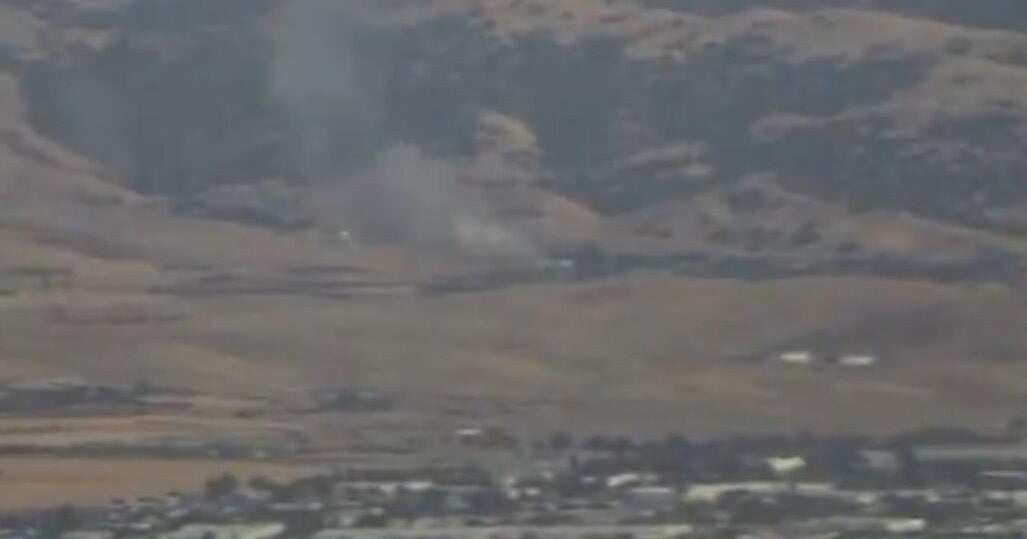Defense Department Creates Program To Tap Silicon Valley Talent
SAN FRANCISCO (KPIX 5) -- The world is rapidly changing thanks in big part to the accelerating, evolving digital technology created in Silicon Valley.
But this technology has even raced ahead of what's available for use by the U.S. military. The fear: that it will get into the hands of those who would seek to do the U.S. harm, putting U.S. security at a technological disadvantage.
Now the military and intelligence officers have turned to the tech industry for help. A remarkable organization run by the U.S. Department of Defense plays a key role.
One such commercial device was in use at a 24-hour Fitness in Livermore by a different kind of warrior.
Oakland Raiders fullback Jamize Olawale uses it as his secret weapon to stay fit, learn new skills and recover more quickly from injuries.
"I'm living proof. I've seen exactly what it can do," joked the San Francisco native.
During Olawale's 20-minute workout, he wears a special high-tech headset. It's connected via Bluetooth to an app on his smart phone.
The device is called Halo Sport. It was developed by Halo Neuroscience, a startup that's located in San Francisco. Halo Sport stimulates a part of the brain called the motor cortex which is responsible for muscle movement.
Users say once you put it on and turn it on, you'll experience a mild or very weak electrical current.
"You feel a little tingling on your head," laughed Olawale.
With it, NFL players, Olympic athletes, even some San Francisco Giants are learning new skills remarkably fast. They're showing improvements in power, explosiveness, and endurance.
"What it would normally take two months to achieve, you can achieve in far less time," explained Olawale.
"When you move, you're learning that movement and we're accelerating that process," said Kane Russell, the head of partnerships at Halo Neuroscience.
The U.S. Department of Defense is tapping into Halo Sport as well as dozens of other cutting-edge commercial technologies many of which were developed by Bay Area startups.
From a communications device that clips onto your tooth, and allows you to hear without your ears, and to communicate through your jawbone in noisy places, to unmanned wind-powered drones packed with sensors that sail the high seas created by Saildrone, these commercial devices can play a role in national defense.
"We can save lives by sending vehicles out into denied environments to do different types of surveillance," explained Nora Cohen of Saildrone.
The military believes high tech products like these hold the promise to better protect the nation, boost national security, and provide troops a technological advantage.
"These companies get to solve some of our nation's toughest problems," said Ernie Bio, Chief Operating Officer at the Defense Innovation Unit Experimental, or DIUx for short
"We've been in operation for two years," explained Bio.
Bio flew F-16 fighter jets for the U.S. Air Force and Cessnas as a commercial pilot. He remembers that only the Cessna had moving map GPS.
"Obviously an 'Aha!' moment where there was this major technical disconnect between what I'm using in a $30 million jet and what I'm using in a little Cessna," said Bio.
To bridge the disconnect between Silicon Valley and the Pentagon, DIUx was created.
The headquarters are right here in Mountain View, close to the tech giants and across the street from Moffett Federal Airfield. The choice of the location was deliberate.
"This is globally known as the innovation hub of the world," explained Bio. "We want to be in the middle of the action."
The unit moves quickly, entering into pilot contracts with commercial technologies, usually in under 90 days.
"If we're going to work here with startups, we'd have to move with the speed the startups work at," said Bio.
DIUx funds projects across all technologies: from drones to artificial intelligence, machine learning and advanced analytics,
In the past 18 months, DIUx has awarded $180 million to 60 pilot projects, including the makers of Halo Sport.
"Maintaining national security especially in light of all the current events that are going on is certainly important for us as an organization," said Russell.
Recently, U.S. Defense Secretary James Mattis paid DIUx a visit. Mattis made it very clear that he supports the effort.
"So we're going to use this teamwork here in order to make our military more lethal and more capable of defending our experiment that we call the United States of America," Mattis said.
As for Halo Sport, U.S. special ops forces are currently trying it out and assessing its effects on marksmanship, close-quarters combat and overall strength training.
"You know, I think it would be a great tool for the U.S. for the military," said Olawale.



